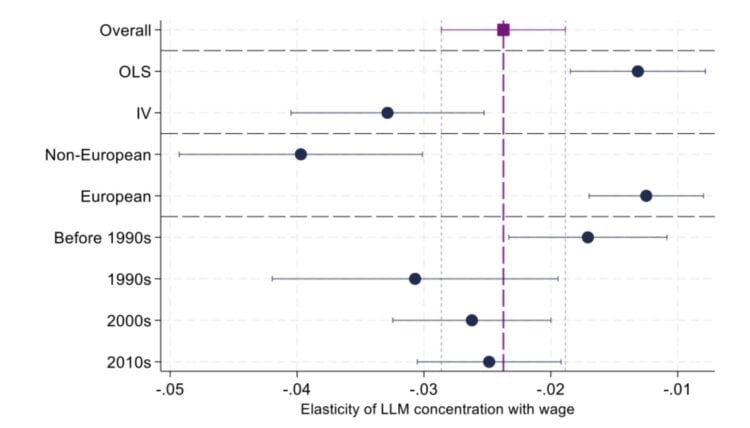What if your wage did not depend on your skills or hard work, but rather on the number of employers in your area? For many workers, this is already the case. Working conditions depend on a variety of factors, but one crucial aspect is the bargaining position of workers relative to their employers. This relationship often favours employers, who typically have access to more information and more options. However, concerns grow that in certain sectors and regions, workers face increasingly limited options for switching employers, thereby weakening their bargaining power.
Indeed, the disparity in wages based on where people work is widening, reflecting greater firm-level differences in pay-setting practices. This phenomenon is also linked to a declining share of total income going to labour.
Why Do Workers Have Limited Options?
There are two main reasons why workers might have few options for changing employers. First, there may simply be a lack of alternative employers in one‘s field of work. This is particularly true in concentrated labour markets, a reality faced by about a fifth of workers. Second, workers can be restricted by anti-competitive practices, such as no-poaching agreements between employers or non-compete agreements that workers are required to sign. The latter is surprisingly common, even in roles where intellectual property concerns are minimal—sandwich makers being a notable example.
Insights from a New ETUI Report
A recent ETUI report delves into these trends, shedding light on the growing monopsony power of employers. The report offers an overview of the burgeoning literature on these issues and extracts key policy lessons. Labour market concentration is pervasive and may be exacerbated by advances in technology. Evidence increasingly links employer concentration in local labour markets to lower wages for both new hires and existing workers, as well as reduced job security.
In a meta-analysis combining 338 estimates from various studies, the report finds that a 10 percent increase in local labour market concentration is associated with on average a 0.2 percent decrease in wages. Notably, this effect is much smaller in Europe, where more regulated labour markets and stronger worker protections are in place.

Note: The figure shows the estimated elasticity and 95 percent confidence interval estimated from random effects meta-analysis, with each variable considered separately.
Non-Compete Agreements: A Barrier to Mobility
A significant proportion of private-sector workers are subject to non-compete agreements, which restrict their ability to move to other employers. In the UK, such agreements affect around 30 percent of workers; in Italy, the figure is 16 percent; and in the Netherlands, estimates range from 20 to 37 percent. Surveys in Finland show close to 40 percent coverage among professional and managerial workers. Crucially, these agreements are not limited to high-level positions involving confidential information. Many lower-level workers are also bound by these contracts, where the primary effect is to reduce mobility and options. Even for highly skilled workers, such agreements often appear disproportionate.
Research links non-compete agreements to reduced mobility, lower wages, and diminished innovation. These economic costs often outweigh the intended benefits, which could be achieved through less restrictive measures such as intellectual property protections or non-disclosure agreements.
Strengthening Workers’ Positions
How can workers’ bargaining power be improved? There are three key approaches:
- Promoting Collective Bargaining: Strengthening trade unions and fostering encompassing collective agreements can help address the imbalance. The EU’s directive on adequate minimum wages aims to promote collective bargaining where it is below 80 percent.
- Tackling Anti-Competitive Practices: Labour market competition could be enhanced through stricter scrutiny of mergers and other anti-competitive behaviours. However, applying competition law to labour markets may require novel approaches.
- Regulating Non-Compete Agreements: Stricter regulation, or outright bans, on non-compete clauses can bolster worker mobility. The United States has proposed banning these agreements, and Austria already prohibits them for certain groups of workers. Clear regulations would also benefit workers, as many are unaware of the legal status of the agreements they sign, and a significant proportion are already non-compliant with existing laws.
Rebalancing Power Dynamics
Addressing monopsony power in labour markets is essential for improving wages, job security, and overall economic health. Strengthening the position of workers relative to employers can lead to fairer and more competitive labour markets, benefiting workers, businesses, and society at large.
Wouter Zwysen is a senior researcher at the European Trade Union Institute, working on labour-market inequality and wages, and ethnic and migrant disadvantage.

